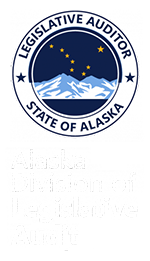| SUMMARY OF: | A Special Report on Training, Policies, and Practices Related to Reporting Suspected Statutory Rape, Department of Health and Social Services, Division of Public Health, April 28, 2008. |
Purpose of the Report
In accordance with Title 24 of the Alaska Statutes and a special request by the Legislative Budget and Audit Committee, we have conducted an audit of training, policies, procedures and practices related to the mandatory reporting of the form of child sexual abuse commonly referred to as statutory rape.
More specifically, we were directed to evaluate these factors as they related to the provision of reproductive health services to adolescents. Our review was limited to health care professionals, specifically Public Health Nurses (PHNs) that fell into one of two groups: (1) those employed by the Department of Health and Social Services (DHSS), Division of Public Health, Section of Public Health Nursing (SOPHN); and (2) those employed by organizations receiving grant funding from DHSS.
Report Conclusions
A summary of the conclusions follows:
- SOPHN mandatory reporting policy addresses child sexual abuse and mandatory reporting statutes. One out of the four DHSS grantees lacks a written policy on child sexual abuse reporting.
- Revision to SOPHN policy lagged behind statutory amendments by more than one year.
- Most PHNs report receiving adequate training on child sexual abuse.
- Child sexual abuse training covers common risk factors of child sexual abuse.
Findings and Recommendations
- The director of Public Health should ensure that SOPHN’s mandatory reporting policy more timely reflect changes in state law.In April 2006, the Legislature amended the child sexual abuse statute, effective immediately. SOPHN was not informed about the amended law in a timely manner. DHSS’ revision and review of the new policy by its legal advisors took over one year, with the new policy being implemented in August 2007. We recommend DPH improve its mechanism for informing SOPHN of changes in statute and for ensuring more timely revisions to policy and procedures.
- The SOPHN chief should amend mandatory reporting policy to better align written guidance with expected practice.Ostensibly, SOPHN’s standard practice is to ask a client who is 15 years old or younger and seeking reproductive health services the age of his or her partner(s). This practice is not reflected in SOPHN’s formal mandatory reporting policy. A third of the PHNs responding to our survey reported they did not routinely ask about the age of the partner during the course of consultation or treatment. This standard practice would be better communicated and more likely to be consistently implemented if incorporated into the written policy and procedures or practice guidelines.
- The SOPHN chief should further strengthen oversight of PHN child sexual abuse training.The majority of PHNs report receiving adequate, frequent, and recent training on child sexual abuse recognition and reporting. However, 12 percent of the public health nurses reported having either received training less than once every five years or having never received training in this area. We encourage management to continue to monitor training and to identify areas and individuals needing additional training.As part of their grant, the agreements between DHSS and the grantees include the assurance that the organizations comply with the State’s child protection statute. SOPHN may wish to consider increasing their oversight by including as an additional grant assurance that the grantee PHNs attend training specifically on child sexual abuse recognition and reporting at least once every five years.
- The commissioner should ensure DHSS complies with child abuse curriculum requirements.State law, at AS 47.17.022, requires all state agencies and local school districts with employees covered by the State’s mandatory reporting law must have a current copy of their training curriculum and materials on file with the Council of Domestic Violence and Sexual Assault. Currently the council does not have either a curriculum or materials for DHSS’ child protection training.We recommend DHSS seek the council’s technical assistance in developing future trainings on child abuse in general and child sexual abuse in particular. We also recommend DHSS file its current child abuse training curriculum and materials with the council for both the council’s review and for accessibility by state mandatory reporters and the general public.

